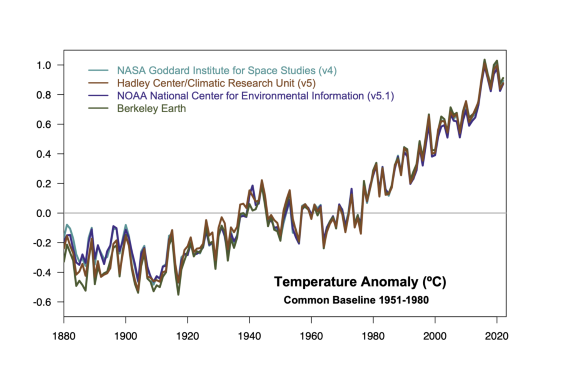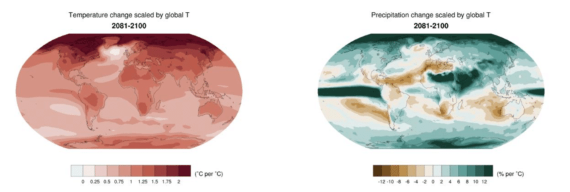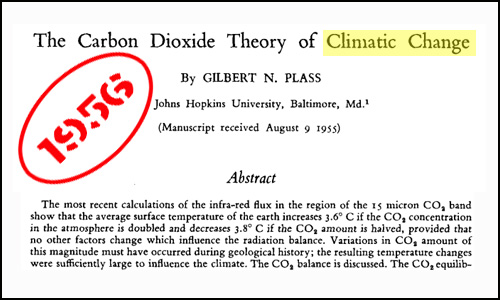
What The Science Says:
The terms ‘global warming’ and ‘climate change’ have been used interchangeably for several decades.
Climate Myth: They changed the name from 'global warming' to 'climate change'
They changed the name from “global warming” to “climate change” after the term global warming just wasn’t working (it was too cold)! (Donald J. Trump)
Have you heard this one? The quote above may be from Trump (a March 2013 tweet) but it's a really common talking-point. It's also utterly meaningless. Firstly, we have the arm-wavy word, "they". Who are 'they'? The United Nations? Greenpeace? The Democrats? Who are 'they'? Let's take a look: depending on your politics you might be surprised.
In the past, global warming and climate change were both in regular use. For example, the landmark 1956 paper that summed up all the accumulated knowledge of the past 100 years was called, "The Carbon Dioxide Theory of Climatic Change". So both terms have been around for ages. In fact, they mean slightly different things. 'Warming' means a rising temperature whilst 'climate' encompasses a lot more issues, such as how wet or dry it is. But who are 'they'?
Step forward Republican advisor and strategist Frank Luntz. Here's the background. In 2002, prior to the midterms, the G.W. Bush administration - not exactly famous for its environmental track-record - sought advice on policy communication. Regarding the climate, Luntz commented thus:
"The scientific debate is closing [against us] but not yet closed. There is still a window of opportunity to challenge the science."
Uh-oh. Look out, reality ahead. Evasive action required! Luntz went on to advise:
"The terminology in the upcoming environmental debate needs refinement, starting with “global warming” and ending with “environmentalism.” It’s time for us to start talking about “climate change” instead of global warming and “conservation” instead of preservation".
The briefing went on to justify the suggested changes:
"“Climate change” is less frightening than “global warming.” As one focus group participant noted, climate change “sounds like you’re going from Pittsburgh to Fort Lauderdale.” While global warming has catastrophic connotations attached to it, climate change suggests a more controllable and less emotional challenge."
So there you have it. The only recorded political move to emphasise the term, 'climate change', over 'global warming' was to try and make the latter feel a bit cuddly to prospective Republican voters in 2002. Who are 'they'? 'They' were the Republicans.
But next time you run into someone trying to suggest this 'change' happened much more recently, you have now got the name of the 1956 paper to mention. If that's not enough, you can also ask them what "CC" stands for in IPCC. It stands for climate change and the IPCC was founded in 1988, fully 35 years ago at the time of writing. Like all climate science denial talking-points, a little scrutiny is all that is needed and they fall down flat. In this case, even less scrutiny than usual!
Please use this form to provide feedback about this new "At a glance" section. Read a more technical version below or dig deeper via the tabs above!
Both of the terms in question, 'global warming' and 'climate change', are used frequently in the scientific literature, because they refer to two different physical phenomena. As the name suggests, 'global warming' refers to the long-term trend of a rising average global temperature, which you can see in fig.1:
Fig. 1: some temperature datasets. All are heading the same way. That's global warming. Graphic: Realclimate.
'Climate change', again as the name suggests, refers to the changes in the global climate which result from the increasing average global temperature. For example, changes in rainfall patterns, increased prevalence of droughts, heat waves and other extreme weather. Projections of future global temperature and precipitation changes (fig. 2) are an example of climate change:

Fig. 2: Patterns of temperature (left) and percent precipitation change (right), averaged across CMIP6 models and all Tier 1 plus SSP1-1.9 scenarios). Climate change deals with a bigger picture relative to global warming. From Tebaldi et al. 2021.
Thus, while the physical phenomena are causally related, they are not quite the same thing. Human greenhouse gas emissions are causing global warming, which is in turn causing climate change. However, because the terms are causally related, they are often used interchangeably in normal daily communications.
The argument, "they changed the name", suggests that the term 'global warming' was previously the norm, and the widespread use of the term 'climate change' is new. However, this is simply untrue. For example, a seminal climate science work is Gilbert Plass' 1956 study 'The Carbon Dioxide Theory of Climatic Change' (fig. 3). Plass estimated the climate sensitivity to a doubling of atmospheric carbon dioxide to be 3.6°C, not far off from today's widely accepted most likely value of 3°C. Barrett and Gast published a letter in Science in 1971 entitled simply 'Climate Change'. The journal 'Climatic Change' was created in 1977 (and is still published today). The IPCC was formed in 1988, and of course the 'CC' is 'climate change', not 'global warming'. There are many, many other examples of the use of the term 'climate change' many decades ago. There is nothing new whatsoever about the usage of the term.

Fig. 3: a screengrab of the landmark Plass paper, published in 1956 - or 67 years ago at the time of writing!
In fact, according to Google Books, the usage of both terms - in books published in the United States - has increased at similar rates over the past 40 years(fig.4):
Fig. 4: historical usage of the terms 'climate change' and 'global warming' in books published in the USA.
And a Google Scholar search reveals that the term 'climate change' was in use before the term 'global warming', and has always been the more commonly-used term in scientific literature (fig.5):
Fig. 5: historical Google Scholar searches for global warming and climate change. Again, both are searched for but this time, climate change is ahead, going back decades.
Those who perpetuate the, "they changed the name" myth generally suggest two reasons for the supposed terminology change. Either because (a) the planet supposedly stopped warming, and thus the term 'global warming' is no longer accurate, or (b) the term 'climate change' is more frightening.
The first premise is demonstrably wrong and somewhat dated. As fig.1 clearly shows, the planet continues to accumulate heat.
The second premise is also wrong, hilariously so, as demonstrated by perhaps the only individual ever to actually advocate changing the term from 'global warming' to 'climate change'. That was none other than Republican political strategist, Frank Luntz, in a now controversial memo (PDF), advising conservative politicians on communicating about the environment. He wrote:
"It’s time for us to start talking about “climate change” instead of global warming and “conservation” instead of preservation."“Climate change” is less frightening than “global warming”. As one focus group participant noted, climate change “sounds like you’re going from Pittsburgh to Fort Lauderdale.” While global warming has catastrophic connotations attached to it, climate change suggests a more controllable and less emotional challenge."
So to sum up, the term 'climate change' has been in frequent use in the scientific literature for many decades and the usage of both terms has increased over the past 40 years. Moreover, since the planet continues to warm, there is no reason to change the terminology. Perhaps the only individual to advocate the change was a Republican political strategist and global warming skeptic, who used focus group results to determine that the term 'climate change' is less frightening to the general public than 'global warming'. So there is simply no factual basis whatsoever to the myth "they changed the name from global warming to climate change". Case dismissed.
To explore this topic further, the chapter, 'Polluted Discourse: Communication and Myths in a Climate of Denial' (Jacobs et al. 2016) is a deep drill-down into the evolution of this, among other, climate myths. If it becomes freely available we'll update this rebuttal.
 |
The Skeptical Science website by Skeptical Science is licensed under a Creative Commons Attribution 3.0 Unported License. |